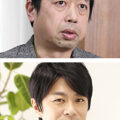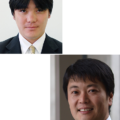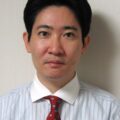Udo Yumiko’s My Fair Person: What Can Be Seen from the COVID-19 LINE Survey―Miyata Hiroaki, Professor, School of Medicine, Department of Health Policy and Management of Keio University
UDO Yumiko vs Prof. MIYATA Hiroaki

Udo Yumiko, journalist, freelance announcer
Udo Yumiko: Nice to meet you, Professor Miyata. This is my first time talking online with someone that I’ve never met in person before.
Professor Miyata Hiroaki: I’m honored!
Udo: Professor Miyata, you proposed the “Early SNS-Based Monitoring System for the COVID-19 Outbreak in Japan: A Population-Level Observational Study,” gathered massive amounts of health data from many people, and continue with efforts that utilize the next move in COVID-19 measures in cooperation with local governments and the Cluster Response Team of the Ministry of Health, Labour and Welfare (MHLW).
Miyata: Of the approximately 83 million LINE users in Japan, we received responses from about 25 million during the first survey, held from March 31 to April 1. With a response rate of about one-third, it was the second largest survey in Japanese history, excluding the national census.
Udo: This was the first time you carried out such a large-scale survey multiple times in a short time period, right?

Prof. Miyata Hiroaki
Miyata: Yes. At the beginning of May, we sent out the fourth nation-wide survey to everyone, and the theme was “disparity.”
Udo: “Disparity?”
Miyata: Compared to other infectious diseases, what is so troublesome with COVID-19 measures is the tremendous impact not only on the medical system but also on the economy due to the wide-ranging restrictions on activities. It is estimated that the scale of the economic crisis will go beyond that of the Global Financial Crisis and will reach levels similar to the Great Depression from 100 years ago. At the same time, there is a wide variation in economic damages depending on the occupation. This survey was meant to figure out the actual conditions.
Udo: I responded to the survey. So what did you learn from the survey results?
Miyata: Because there tends to be a comparatively large number of young LINE users, this had to be taken into consideration, but from the data, we were able to demonstrate that there is a large disparity in economic damage depending on the occupation. Of the roughly 18 million responses, taxi drivers were the top responders at 82% for answering that they were anxious about employment and/or income. Next were people working in industries related to hair dressing, beauty salons, and cosmetology at 73%, followed by those in industries related to the hotel business and leisure at 71% and those working in industries related to restaurants and bars at 66%. In particular, it is predicted that the short-term recovery of demand for inbound tourism will be difficult. How we deal with this pain is important.
Reasons for Punk Fashion
Udo: I have seen you on TV, Professor Miyata, and I have always been curious about your silver hair and punk fashion, which is uncharacteristic for a university professor!
Miyata: I teach in the medical schools at Keio University and the University of Tokyo, but I’m not a doctor. I am doing research with the goal of improving society by collaborating with medical, governmental, and corporate people in the field using science – big data, AI, and more. I am involved in about 300 projects both in Japan and abroad that will shape our future society, such as “Society 5.0” promoted by the Japanese government, projects with the World Economic Forum, and more. I’m often asked about my hair and clothes, but I think they allow me to express the diversity of the world better than suits.
Udo: 300 projects! Being so busy, what was your motivation to propose a national survey using social media?
Miyata: From the viewpoint of medical policy, infectious diseases are also within my specialty in a broad sense, but up until recently, I have been deeply involved in heart disease, cancer, and other non-infectious diseases, so infectious diseases were not a very related field. I kept my eye on the situation when there were reports on the infections on the Diamond Princess. But while looking at the trends, I felt that it would be difficult to handle with the measures taken thus far.
Udo: So something was problematic?
Miyata: Current infectious diseases measures are centered around specialists in emergency handling of the hyperacute phase of protection measures at ports and airports. This works when SARS-like symptoms are expressed, but two of the characteristics of COVID-19 are its ability to spread even during the incubation period when there are no symptoms and the fact that this period is quite long at two weeks.
At first, Japan engaged in cluster-containment measures, and so only had highly-targeted data on infected persons. And so when the virus could no longer be controlled, measures would be limited. I thought that we needed to work out measures from various perspectives by combining an enormous amount of data, including asymptomatic persons.
Udo: So you zeroed in on social media to figure out the state of the entire country and not just places where clusters had occurred.
Miyata: Eguchi Kiyotaka, an Executive Officer at LINE, and I had acted as advisors to Kanagawa Prefecture before, and we had considered approaches using LINE. The initial cluster-containment measures were successful, and my friends at the MHLW were fighting against COVID-19 day and night. However, they were forced to use many resources with these counter reactions, and I heard of their predicament in not being able to plan anything new. The motivation behind the start of our project was a desire to deliver support that could only be done from the outside.
Creating the System in A Week
Udo: In addition to surveying the whole country, you also offer support where, if a person adds the “new coronavirus measures personal support” (currently administered in 18 areas) LINE official account for their area to their friend list, they will be notified when they can visit medical institutions and will be able to have individual consultations, based on user status.
Miyata: Yes. The symptoms presented by people infected with COVID-19 change all the time, so getting updated information is difficult. One of the major goals was to offer individualized support by gathering and updating information in one place.
Udo: When did you create the concept for the system?
Miyata: We started at the end of February. At first, we hoped to have it ready by the middle of March, but with simultaneous school closures decided at the beginning of March and knowing we wouldn’t finish at that rate, we finished it in one week. I have yet to meet the majority of the members who developed the system.
Udo: Just one week!
Miyata: Yes. To secure space to store the enormous amount of data, we reached out to Amazon and they immediately agreed. I am extremely grateful for the cooperation that both Amazon and LINE offered free of charge.
Udo: Even though these are large companies, they made decisions quickly, didn’t they?
Miyata: These companies are always thinking about what kind of work they should be doing to be trusted by society, and then put that in to practice. I think that they are greatly aware of the fact that “trust” will be the next social buzzword.
Fears of a Data Surveillance Society
Udo: Professor Miyata, together with the MHLW, you put forth the idea of “PeOPLe (Person centered Open PLatform for well-being),” an information base that consolidates the health and pharmaceutical history of each resident of Japan, four years ago, and it is expected to begin operation in stages starting in 2020.
Miyata: Yes. The basic concept for “PeOPLe” is to make each person’s data open and utilize it as open information infrastructure, and the LINE project is one practical application of “PeOPLe,” in a manner of speaking.
Udo: You said that an “Era of Data-driven Society” is coming, where society will run on data for some time, but will this trend become increasingly stronger post-COVID?
Miyata: If we look at the top ten companies by market capitalization, the top ranks are already filled by GAFA (Google, Apple, Facebook, Amazon) and China’s Alibaba, Tencent, and other companies that are strong in data. Society is already running on data, not oil. Of this data, it is considered that use of personal data will become the main economic and social issue, and corporations in the health field and other fields are putting effort in to this.
Udo: COVID-19 came along right in the middle of this.
Miyata: Up until now, no one thought that GAFA platforms would cooperate together, but new trends are being created, such as Apple and Google joining forces to develop an app to track people who have come in contact with patients that tested positive for COVID-19. As the balance between life and the economy is being called into question, the concept of using data and AI not just for corporate profit but also to solve social problems “for the social good” is becoming common sense.
Udo: I see. However, Japanese and overseas companies are presenting a variety of data and it shocks me how much they are able to see. If it’s to save lives, do we have to allow personal data to be monitored and diverted to some degree?
Miyata: That’s a difficult one. I think we must not use this as an opportunity to endorse a surveillance state. For example, overseas, people who have come in contact with an infected person are found by using the GPS function in cell phones and tracking the logs of a person infected with COVID-19, and that person will be isolated on the basis that they rode in the same train car two days earlier with the infected person. They will then be monitored for 24 hours where they are isolated, and an alert will be sounded if they take even one step outside. Going this far will surely limit infections. But the problem is that there are cases where a resident isn’t able to call this in to question.
Udo: Scary. So these kinds of measures are allowed?
Miyata: I think that the use of GPS functions is one option as a measure against infectious diseases. But if it’s a democratic country, then the balance between privacy and infectious disease measures must be considered during open discussions. In Taiwan, they are taking an approach that comes to grips with this as they present information openly to residents.
Udo: I see. But it takes time to democratically explain each measure, one at a time, before putting them into practice, doesn’t it. The virus won’t wait for that.
Miyata: I think that this first nation-wide survey was the first step. The country isn’t taking in data without asking, but is gathering information and then offering information that is useful to each person, after gaining the people’s consent and understanding. There ought to be a way to control infectious diseases by building trust in democracy itself.
Udo: What should we do?
Miyata: Many people are interested in who it is that has the data. But what is more important is the purpose of use of that data. It is necessary to build trust in the fact that the data is being used in an appropriate way by a limited number of people while limiting its use for the purpose of sharing with society and other people.
Data Will Become a Collective Commodity
Udo: If trust is built, will we be able to think of measures globally based on data rather than have each country doing it separately?
Miyata: Yes, that’s right. The second wave and the third wave will surely come. Even if we can control infections just in Japan, the Olympics will be a pie in the sky if we can’t curb infections in Africa by next summer. PCR tests are expensive, so I think the knowledge to offer necessary support from symptom diagnosis gained from this project will be used in developing countries.
Udo: So rather than putting our own country first, we must expand our field of vision to the world.
Miyata: The World Economic Forum is currently discussing the concept of “Data Collaboration for the Common Good.” Because oil is a limited resource, it is exclusively owned. This is a basic principle of the economy. Data, on the other hand, can be shared. If you share one person’s data with 10,000 people, those 10,000 people can receive better medical care. It is necessary to redesign our social design so that data can be gathered in the 10’s of thousands and 100’s of thousands and be used to make society better.
Using My Number Cards (individual number cards)
Udo: I have a feeling that Japan is getting left behind from these global movements. This national survey also started with Kanagawa Prefecture and wasn’t for the entire country, right?
Miyata: Yes. If you suddenly take it to the national level, you’ll get arguments wondering why a single company is being used, and it takes time to pass an ethical review, even for a university, right? The Kanagawa Prefectural Government made a decision to take responsibility and produced some results in their area, and then the MHLW also embarked on the national survey. If there had been no decision by the Kanagawa Prefectural Government at first, I don’t think we would’ve been able to take the first step.
Udo: I see. It seems that COVID-19 will become a turning point to make us think about what a leader should be in times of crisis.
Miyata: In that sense, German Chancellor Angela Merkel showed remarkable leadership based on scientific data and increased her approval rating. France also decided to reopen schools due to widening disparity. Deeply concerned that children of poor households would lose their opportunities for education from school closings, French President Emmanuel Macron spoke directly to residents and sought their understanding.
Udo: So he saw the problem in the educational disparity as well as infection risks.
Miyata: On the other hand, methods to gain popularity through words or policies that give a temporary positive feeling will not hold true in this phase. Even if President Trump says, “Make America Great Again,” false statements are immediately proven false using scientific evidence and objective facts. If looking at politics in this way takes root as a custom, then it may be a positive sign for democracy.
Udo: Then again, evaluations of Japanese politics is a bit severe, isn’t it. It’s difficult to say that “Abenomask,” where two masks were distributed to each household, and the “Special Cash Payments of 100,000 yen per person” were well received.
Miyata: That’s right. If the My Number Cards (individual number cards) had properly come into wide use, then the masks would’ve been delivered to each person fairly, instead of to each household. With the special cash payments, as well, the original plan was a good one, I thought, with Kishida Fumio, Chairperson, Policy Research Council of the Liberal Democratic Party suggesting giving 300,000 yen only to families that needed it, giving the payments in response to economic loss and not in a uniform way. But there wasn’t a system in place to make that happen quickly.
Udo: The long-awaited My Number Cards still weren’t being utilized.
Miyata: Protection of personal data as it relates to the My Number Cards was discussed, but there weren’t any specific examples shared of how the cards or the data could be used to make residents’ lives better. These lessons will have to be applied moving forward.
Udo: In what ways, for example?
Miyata: There is no question that the problem with traveling abroad will be discussed moving forward. If you go abroad now, in many cases, you have to quarantine for two weeks both at your destination and after returning back to Japan, meaning you waste a total of one month’s time. In the future, it may be possible to limit local restrictions on activities by proving you’ve had the vaccine or by proving that you are a low risk for infection by showing contact history or behaviors to avoid risk.
Udo: Are you saying something like a visa that proves a person doesn’t have COVID-19 will be required?
Miyata: Yes. For example, it may be required to prove that a person won’t spread infections, similar to how ESTA (Electronic System for Travel Authorization) connects passports with individual numbers. If this isn’t possible, then it may put a halt to residents of Japan engaging in activities abroad. For example, people from China and South Korea can engage in activities abroad without restriction by showing this kind of proof, but people from Japan can’t as Japan doesn’t have the data. As a result, there is the possibility that only residents of Japan will miss out on opportunities by having to quarantine for a month each time they travel. It is necessary to gather data to be used in this way.
Udo: On April 7, the Declaration of a State of Emergency was lifted, so in general, is it okay to think that Japan’s COVID-19 outbreak is moving towards its peak?
Miyata: Japan has calmed down overall. Tokyo has also controlled its explosive increase in cases. But the problem is whether or not we can move the economy while controlling the spread of infections. If there is another declaration of a state of emergency, then the economic damage will be severe. An extremely major issue is whether or not we can come to understand the signs of the spread of infection and respond as quickly as possible. Cluster infections are occurring even in South Korea, where the number of new patients nationally was in the single digits. Masks, ensuring social distancing, and the so-called “3Cs” measures (closed spaces, crowded places and close-contact settings) will continue to be important.
Cannot Recommend the BCG vaccine
Udo: What do you think about the approach of herd immunity, where the economy isn’t shut down, like in Sweden?
Miyata: Sweden is the worst in the world for deaths per capita. Many people died in Lombardy, Italy and in New York, but the percentage of people just in those areas with antibodies is in the tens. If you have the antibodies, you can relax just a little bit, but in China, research results have come out saying that one-third of the antibodies have disappeared.
Udo: It’s quite intense, isn’t it.
Miyata: What is so difficult about COVID-19 is that there is a large difference in number of deaths based on area. It is even very different between eastern and western Europe, and luckily, Japan and the rest of Asia are areas where there are few deaths.
Udo: And why is that? Is it because they are administering the BCG vaccine?
Miyata: Even if a BCG vaccination from childhood is effective against COVID-19, there is no scientific evidence for adults receiving the inoculation, so I cannot recommend getting a BCG vaccine for adults. If adults take children’s vaccines then it will only bring about different casualties.
Creating the “New normal”
Udo: So BCG is also bad? If that’s the case, we just have to wait for the vaccine, don’t we?
Miyata: In Japan, there are reports that vaccine development can be done in one year, but the WHO is a little more cautious. Even if a vaccine were to be developed in a year, it would take time for the vaccine to reach many people.
Udo: So then, do we just keep repeating staying at home voluntarily when infections spread?
Miyata: In April, Keio University Hospital administered PCR tests to all patients before they were admitted, and we learned that 3% were infected without any symptoms. In other words, there may be many more infected people in Japan whose illnesses have not become severe. Currently, medical associations, the MHLW, and more are planning antibody tests. Future measures need to evolve based on the proportion of people with antibodies. Through considering measures keeping the present state of infections in mind, we may be able to control another spread of infections and take measures that restore the economy. There are, however, an incredibly large number of parts of this virus that are unknown. I think that the only way forward is to take it one step at a time while gathering various data.
Udo: As I’m single, staying in voluntarily is depressing, but is there no choice but to give up on returning to our former lifestyles?
Miyata: There is surely no future beyond the global growth projected in 2019. We have to think about the future assuming that many things will clearly change. I call this the “new normal,” but it is a concept that was used for the changes that occurred after the Global Financial Crisis in the context of the extraordinary becoming the new norm. We are now seeing changes occur that go beyond this. But, at the same time, this is a chance for all industries. New cultures are being created that go beyond conventional concepts. For example, industries that involve human contact will be greatly limited in the short term, but high-end restaurants will start offering take-out, and it will become possible to eat this food even while at home.
An Unchanging Equation for Humankind
Udo: The education field also began to quickly go online, didn’t it.
Miyata: It has become a chance to consider again whether school education – gathering children in one room and offering the same education – is the best format or not. What is needed in society moving forward is the ability to discover and solve social problems as a team. The ideal instructor ought to be someone who considers necessary support for each student in order to foster this ability.
And if remote education progresses, chances for regional revitalization may spread. Up until now, there have been cases where education has been a barrier to regional revitalization. Even when hospitals in depopulated areas have invited top doctors from around the world, they return to their home countries after a few years, with the reason being that there isn’t a place for them to educate their families. If remote education progresses, then surely it will become possible to receive an education that matches each individual, even in the countryside.
Udo: Can the chaotic field of education do such a thing?
Miyata: If we try to do something remote in place of education as it has been up until now, it will be an inferior version. I think it is necessary to create a “new normal,” taking the opportunity to realize what we haven’t been able to up until now. Every industry is being exposed to an intense pressure for survival, and this requires companies to rise up while changing the ways in which the industry itself creates value, and I think that organizations and companies that can do this may become the next leaders.
Udo: So companies cannot be bound to the way things were done in the past?
Miyata: It is said often, and if we look at history, the Renaissance occurred after the black death wreaked havoc, right? Civilizations always change in new ways when a social crisis appears, and the potential for the next society and of humankind are desperately born out of the struggle. If we can find the time to properly consider this through understanding today as one of those times, I think that we may be able to take a positive direction for Japan’s future.
Udo: What word do you think will become a buzzword for this next era?
Miyata: I think that people will become the center of the next society. People won’t be the gears of society or economic activity, but people will become the center. It will become an era where we think of society starting with life, and it is something we must do. I thought of this because of Leonardo da Vinci’s Mona Lisa.
Udo: That truly is a masterpiece of the Renaissance, isn’t it?
Miyata: Da Vinci made remarkable achievements not just in art, but in medicine, civil engineering, science, and a variety of fields, and he has been called the “universal genius.” But it has become clear that to him, all of his achievements were practice for painting the Mona Lisa. Da Vinci continued to touch up the Mona Lisa until right before he died, and he repeated his practices and continued to contribute to society in order to reach his goal. He left behind these mysterious words from during his lifetime: “Let no man who is not a Mathematician read the elements of my work.” What he expressed in his Mona Lisa was that, “As long as man is man, he will always require relationships with others. What is important to society is that people are connected with positive emotions.” I think that this itself is an unchanging equation for humankind. I also want to do my job like da Vinci’s Mona Lisa.
Udo: What does the Mona Lisa become to you?
Miyata: It may be a system or it may be society itself. Or I may not yet know what that is, but I want to work so that I can make contributions at the turning point in our civilization in order to create a better society through repeating practices rather than just talking about ideas.
To Professor Miyata Hiroaki
I was advised by the leading person engaged in COVID-19 infectious diseases measures to speak with Professor Miyata because I was told he can see a vision for the next society, and thus this first online conversation was born. The future spoken about by this young, silver-haired man covered in cool fashion, is calm and specific, and has a realness to it that is not pessimistic or unrelenting. You have brought a ray of light into this single person’s depressing room. While many people were frozen with COVID-19 anxiety, you made a move, and I admire the work that you have already done that will remain in the future. While having high expectations for your future successes, I hope to also consider the reported “new normal” while smiling like the Mona Lisa (or is that a little creepy?).
Translated from“Udo Yumiko no mai fea pason (No. 18) Korona rain chosa de mietakoto ― Miyata Hiroaki , Keio daigaku igakubu kyoju (Udo Yumiko’s My Fair Person (No. 18): What Can Be Seen from the COVID-19 LINE Survey―Miyata Hiroaki, Professor, School of Medicine, Department of Health Policy and Management of Keio University),” Bungeishunju, July 2020, pp. 344–353. (Courtesy of Bungeishunju, Ltd.) [September 2020]
Keywords
- Udo Yumiko
- Miyata Hiroaki
- Keio University
- COVID-19 LINE Survey
- Kanagawa Prefecture
- Cluster Response Team
- Ministry of Health, Labour and Welfare
- LINE
- Amazon
- GAFA
- PeOPLe
- Person centered Open PLatform for well-being
- Era of Data-driven Society
- Data Collaboration for the Common Good
- My Number
- education
- Mona Lisa




